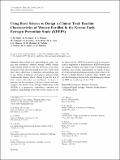| dc.contributor.author | Black, D. M. | |
| dc.contributor.author | Brinton, E. A. | |
| dc.contributor.author | Budoff, M. J. | |
| dc.contributor.author | Cedars, M. I. | |
| dc.contributor.author | Hodis, H. N. | |
| dc.contributor.author | Merriam, G. R. | |
| dc.contributor.author | Naftolin, F. | |
| dc.contributor.author | Santoro, N. | |
| dc.contributor.author | Harman, S. M. | |
| dc.contributor.author | Miller, V. M. | |
| dc.contributor.author | Lobo, R. A. | |
| dc.contributor.author | Manson, JoAnn Elisabeth | |
| dc.contributor.author | Taylor, H. S. | |
| dc.date.accessioned | 2011-05-15T22:10:44Z | |
| dc.date.issued | 2009 | |
| dc.identifier.citation | Miller, V. M., D. M. Black, E. A. Brinton, M. J. Budoff, M. I. Cedars, H. N. Hodis, R. A. Lobo, et al. 2009. Using Basic Science to Design a Clinical Trial: Baseline Characteristics of Women Enrolled in the Kronos Early Estrogen Prevention Study (KEEPS). Journal of Cardiovascular Translational Research 2(3): 228-239. | en_US |
| dc.identifier.issn | 1937-5387 | en_US |
| dc.identifier.uri | http://nrs.harvard.edu/urn-3:HUL.InstRepos:4889519 | |
| dc.description.abstract | Observational and epidemiological studies suggest that menopausal hormone therapy (MHT) reduces cardiovascular disease (CVD) risk. However, results from prospective trials showed neutral or adverse effects most likely due to differences in participant demographics, such as age, timing of initiation of treatment, and preexisting cardiovascular disease, which reflected in part the lack of basic science information on mechanisms of action of hormones on the vasculature at the time clinical trials were designed. The Kronos Early Estrogen Replacement Study (KEEPS) is a prospective, randomized, controlled trial designed, using findings from basic science studies, to test the hypothesis that MHT when initiated early in menopause reduces progression of atherosclerosis. KEEPS participants are younger, healthier, and within 3 years of menopause thus matching more closely demographics of women in prior observational and epidemiological studies than women in the Women’s Health Initiative hormone trials. KEEPS will provide information relevant to the critical timing hypothesis for MHT use in reducing risk for CVD. | en_US |
| dc.language.iso | en_US | en_US |
| dc.publisher | Springer US | en_US |
| dc.relation.isversionof | doi:10.1007/s12265-009-9104-y | en_US |
| dc.relation.hasversion | http://www.ncbi.nlm.nih.gov/pmc/articles/PMC2721728/pdf/ | en_US |
| dash.license | LAA | |
| dc.subject | menopause | en_US |
| dc.subject | hormone treatment | en_US |
| dc.subject | conjugated equine estrogen | en_US |
| dc.subject | women’s health initiative | en_US |
| dc.subject | timing hypothesis | en_US |
| dc.title | Using Basic Science to Design a Clinical Trial: Baseline Characteristics of Women Enrolled in the Kronos Early Estrogen Prevention Study (KEEPS) | en_US |
| dc.type | Journal Article | en_US |
| dc.description.version | Version of Record | en_US |
| dc.relation.journal | Journal of Cardiovascular Translational Research | en_US |
| dash.depositing.author | Manson, JoAnn Elisabeth | |
| dc.date.available | 2011-05-15T22:10:44Z | |
| dash.affiliation.other | SPH^Epidemiology | en_US |
| dash.affiliation.other | HMS^Medicine-Brigham and Women's Hospital | en_US |
| dc.identifier.doi | 10.1007/s12265-009-9104-y | * |
| dash.authorsordered | false | |
| dash.contributor.affiliated | Manson, JoAnn | |


